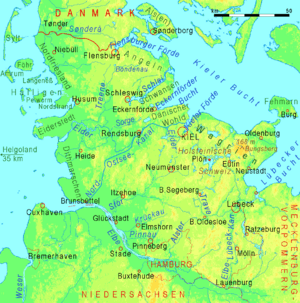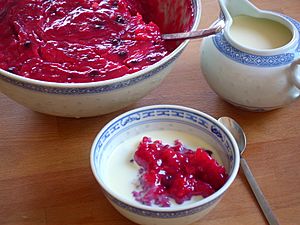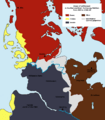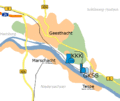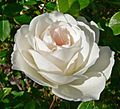Schleswig-Holstein facts for kids
Quick facts for kids
Schleswig Holstein
|
|||
|---|---|---|---|
|
|||
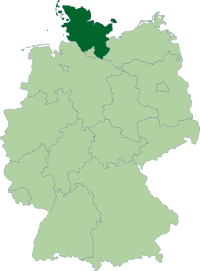
Position of Schleswig-Holstein within Germany
|
|||
| Country | Germany | ||
| Capital | Kiel | ||
| Area | |||
| • Total | 15,763 km2 (6,086 sq mi) | ||
| Population
(November 2006)
|
|||
| • Total | 2,834,305 | ||
| • Density | 179.807/km2 (465.699/sq mi) | ||
| Time zone | UTC+1 (CET) | ||
| • Summer (DST) | UTC+2 (CEST) | ||
| Website | schleswig-holstein.de | ||
Schleswig-Holstein is the most northern of the 16 states in Germany. Its name in Danish is Slesvig-Holsten. In Low Saxon, it is called Sleswig-Holsteen, and in Frisian, it is Sleeswyk-Holstein.
Schleswig-Holstein shares a border with Denmark to the north. To the west is the North Sea. The Baltic Sea and Mecklenburg-Western Pomerania are to the east. To the south, it borders Lower Saxony and Hamburg. The city of Kiel is the capital of this state.
There are four main independent towns in Schleswig-Holstein:
Contents
Exploring Schleswig-Holstein's Geography
Schleswig-Holstein is located at the base of the Jutland Peninsula. It lies between the North Sea and the Baltic Sea. The name "Schleswig" refers to the southern part of Schleswig in Germany. The northern part of Schleswig is in Denmark. The state also includes Holstein, Lauenburg, and the city of Lübeck.
The state borders Denmark to the north. To the west is the North Sea. The Baltic Sea is to the east. To the south, it borders the German states of Lower Saxony, Hamburg, and Mecklenburg-Vorpommern.
Western Lowlands and Islands
The western part of Schleswig-Holstein is mostly flat. It has very few hills. The North Frisian Islands are here. Most of Schleswig-Holstein's North Sea coast is part of a special area. This area is the Schleswig-Holstein Wadden Sea National Park. It is the largest national park in Central Europe. Heligoland is Germany's only island far out in the North Sea.
Eastern Coast and Hills
The Baltic Sea coast in the east has many bays and fjords. It also has steep cliffs. You can find rolling hills and many lakes here. This is especially true in eastern Holstein, known as Holstein Switzerland. The highest point is the Bungsberg, which is 168 meters (551 feet) tall. Fehmarn is the only island off the eastern coast.
The longest river, besides the Elbe, is the Eider. The most important waterway is the Kiel Canal. This canal connects the North Sea and the Baltic Sea.
Culture and Traditions
Schleswig-Holstein has a mix of Danish and German cultures. Old castles and large country homes show this blend. Some foods are also shared, like Rødgrød. This is a red berry pudding. Many surnames, like Hansen, are also common in both areas.
Popular Festivals and Events
The most important festivals are the Kiel Week and the Schleswig-Holstein Musik Festival. Kiel Week is a big sailing event. The Music Festival is an annual classical music festival held across the state. The Lübeck Nordic Film Days is another important event. It is a film festival for movies from Scandinavian countries. It takes place in Lübeck every year.
The annual Wacken Open Air festival is very famous. It is known as the world's largest heavy metal rock festival.
Museums and Arts
The state's main museum for cultural history is in Gottorf Castle in Schleswig. It tells the story of the region. The famous opera singer Klaus Florian Vogt is also from Schleswig-Holstein.
Images for kids
-
A boundary stone for the District of Ostholstein
-
The main office of Dräger in Lübeck
-
North Sea Coast at Amrum
-
Red Cliff on Sylt
-
Historic City Center of Lübeck
-
Baltic Sea Coast at Timmendorfer Strand
-
The island of Heligoland
-
The Kiel-Canal as seen from the North Sea
-
The Kiel-Canal as seen from the Baltic Sea
-
A freighter moving through the Kiel Canal
-
The Port of Lübeck
-
University of Applied Sciences in Lübeck
See also
 In Spanish: Schleswig-Holstein para niños
In Spanish: Schleswig-Holstein para niños
 | Jewel Prestage |
 | Ella Baker |
 | Fannie Lou Hamer |




